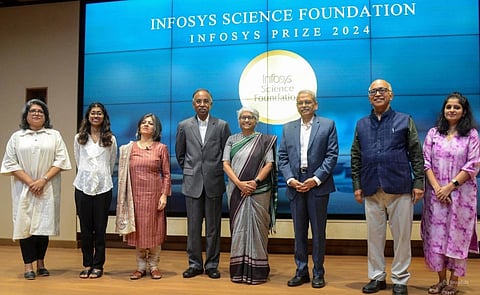

Research institutions succeed only when they are completely free from interference by bureaucrats and politicians. The freedom allows them to focus on governance, management and academic work without any external pressure, said Infosys Founder NR Narayana Murthy.
He was speaking at the Infosys Science Awards, hosted by Infosys Science Foundation (ISF) on Thursday, November 14, during which six awardees, including two women, were recognised for their breakthrough research across categories.
Each laureate received a gold medal, a citation, and $100,000.
Murthy pointed out that successful institutions share common traits, including academic freedom, openness to new ideas, a culture that values merit over titles, and lack of fear of failure, stated a report by The New Indian Express.
“The aim is to encourage young researchers to take on challenges and find solutions to great problems,” he said. A 'great problem' is one that impacts a large number of people and has solutions based on solid STEM theories. “This ensures the solution is not only effective but also verifiable, repeatable and scalable," he added.
He also mentioned that while there is a lot of wealth in India, more of it should be directed toward research. “Many wealthy individuals donate to charity, education and healthcare, but a portion of this money could also help solve critical research problems,” he said, adding that Indian companies do not invest enough in research and development.
ISF President Kris Gopalakrishnan stressed the need to increase research funding in India, pointing out that the country currently spends only 0.7% of its GDP on research.
“While the government's expenditure is growing, industry investment should also rise. To encourage this, the government could offer incentives such as tax credits for research investments,” he said.
He also highlighted a recent revision in the Infosys Science Foundation’s eligibility criteria, changing the upper age limit for awards to 40, which was 50 previously.
“This change aims to better connect with young scientists and recognise their contributions,” Gopalakrishnan said. The foundation has planned a series of lectures in January, where awardees will present their work.
WINNERS
* Economics:
Prof Arun Chandrasekhar, Department of Economics, Stanford University, USA. For research on social and economic networks, using data from Karnataka villages
* Engineering and Computer Science:
Professor Shyam Gollakota, School of Computer Science and Engineering, University of Washington. For innovative contributions in affordable healthcare technologies, battery-free computing, and AI-enhanced auditory systems
* Humanities and Social Sciences:
Mahmood Kooria, Lecturer at School of History, Classics, and Archaeology, University of Edinburgh. For groundbreaking studies on maritime Islam, with focus on Kerala’s transformation
* Life Sciences:
Siddhesh Kamat, Associate Professor, Department of Biology, Indian Institute of Science Education and Research, Pune. For uncovering role of bioactive lipids in cellular functions
* Mathematical Sciences:
Professor Neena Gupta, Theoretical Statistics and Mathematics unit, Indian Statistical Institute, Kolkata. For solving the Zariski Cancellation Problem, a pivotal challenge in algebraic geometry
* Physical Sciences:
Vedika Khemani, Associate Professor, Physics department, Stanford University, USA. For her discovery of time crystals, with the potential to revolutionise quantum computing
